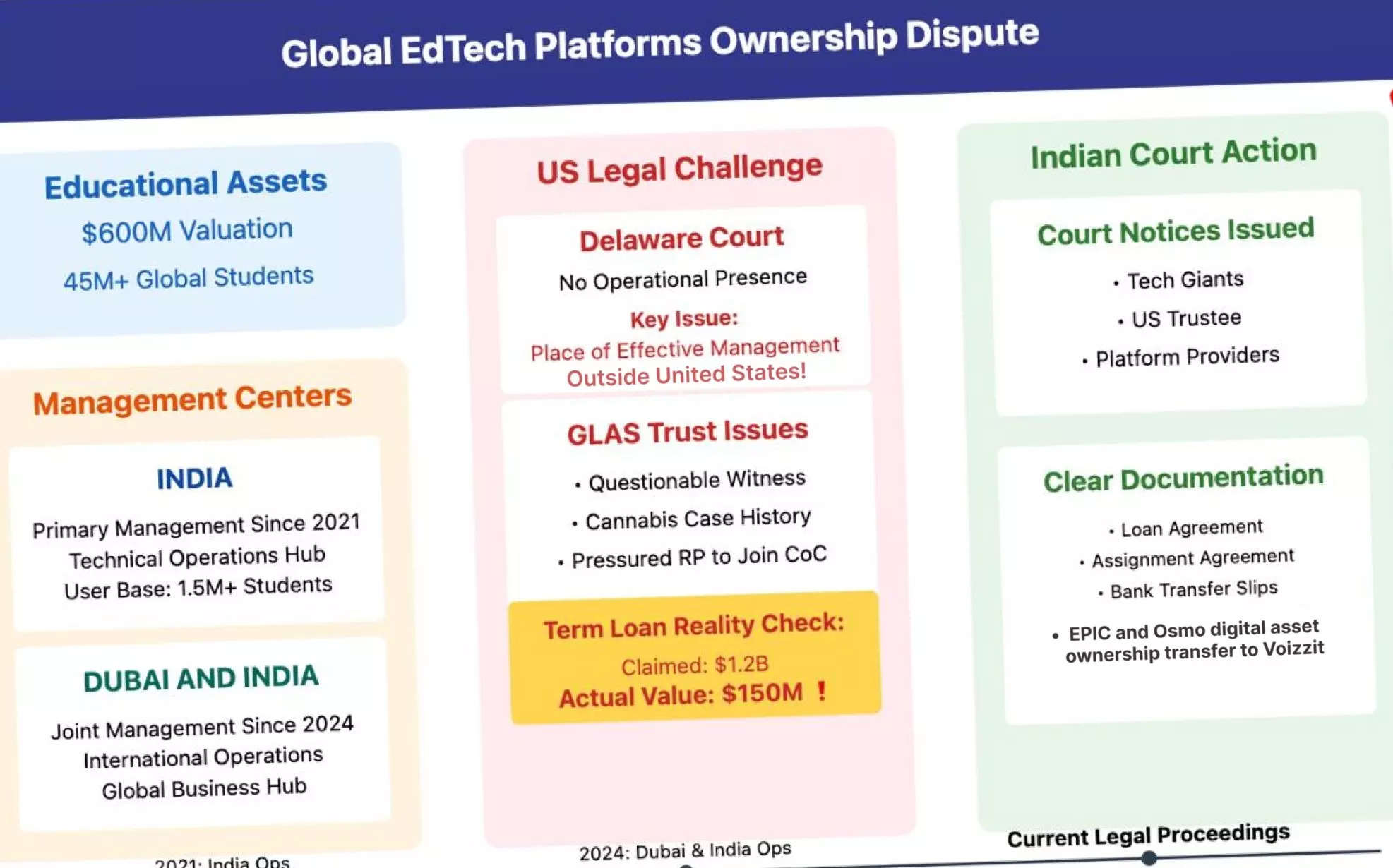
ERNAKULAM (Kerala): In a move that could reshape international digital asset disputes, the Commercial Court at Ernakulam has issued notices to multiple parties, including US-based Chapter 11 Trustee Claudia Springer and major tech companies, challenging the jurisdiction of Delaware courts over educational platforms Epic and Osmo.
The lawsuit, filed by Voizzit Information Technology LLC and Rajendran Vellapalath, seeks to establish ownership rights over getepic.com and playosmo.com – platforms serving over 45 million students globally. These assets were valued at over $600 million when initially acquired by BYJU’S in 2021.
Jurisdictional Battle and Financial Complexities
The dispute centers on Vellapalath’s assertion that the platforms’ place of effective management has been based in India since Think & Learn’s 2021 acquisition and subsequently by Voizzit in India and Dubai since April 2024. Through a $100 million loan assignment arrangement, Voizzit acquired significant rights over Epic and Osmo in April 2024.
At the heart of the controversy lies a term loan facility to Think and Learn (BYJU’S parent company), now valued at $150 million – significantly less than its original $1.2 billion face value. This valuation emerged from a term sheet presented by William Hailer to Vellapalath during a meeting at BYJU’S Dubai residence.
Creditor’s Controversial Tactics Surface
Documents submitted to the Court have revealed troubling tactics employed by the lawyers of GLAS Trust Company LLC, representing BYJU’S lenders. Between July 31 and August 21, 2024, GLAS’s legal representatives reportedly exerted “intense pressure” on the Resolution Professional to include them in the Committee of Creditors (CoC), despite questionable claim status. Sources familiar with the proceedings report that GLAS’s lawyers persistently pushed for expedited CoC formation during a period when all CIRP activities were meant to be on standstill, raising concerns about their attempts to influence the resolution process.The Resolution Professional in India ultimately rejected GLAS’s position, classifying their claim as contingent and excluding them from the CoC. This decision followed careful review of multiple objections, including concerns about unsigned credit agreements and pending applications.
GLAS Trust’s case faced further scrutiny over their reliance on William Hailer as sole witness in Delaware proceedings. Hailer, is a known person with a non credible record, who recently settled a $1.2 million lawsuit with South Dakota cannabis companies over fraud allegations in August 2024. His involvement in both cases has led to increased scrutiny of his testimony in the Epic and Osmo proceedings, especially regarding a brief 10-minute meeting where he presented disputed term sheets.
Educational Impact and Technical Stakes
The dispute’s implications extend beyond legal boardrooms to millions of students and teachers worldwide. Critical software updates hang in the balance, threatening potential disruption to these essential learning platforms. The Ernakulam court’s notices to tech giants including Apple, Google, Stripe and Cloudflare highlight the case’s technical complexity, as these companies provide crucial infrastructure from app store presence to cloud services.
“The fundamental issue here is about territorial jurisdiction and rightful ownership,” explains a senior legal expert familiar with the case. “When a company’s place of effective management is clearly outside US borders, it raises important questions about the reach of US bankruptcy proceedings.”
Looking Ahead
The Indian court‘s examination of operational and management history could set precedents affecting future disputes over digital assets globally. As technology platforms increasingly operate across borders while being managed from multiple jurisdictions, the case’s outcome could reshape how international courts approach similar conflicts.
The case continues to draw attention from legal experts and tech industry observers worldwide, particularly given its potential impact on educational access and future digital asset ownership disputes across international borders.


